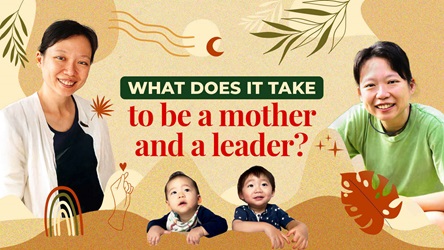“I Wanted To Change The World”

Ms Ang Bee Lian was once courted by a mamasan.
As a young social worker fresh out of university, the current CEO of NCSS had knocked on the woman’s door trying to investigate if she was abusing her child.

While answering the woman’s pointed questions about her own salary, Ms Ang managed to work her way to the door. “I still remember before I left, she told me in Cantonese – if you’re in trouble, come and look for Mummy! She wanted to recruit me when she realised I was earning very little!”
Over the last 30 years, Ms Ang, a decorated social work veteran who has chalked up awards including an Outstanding Social Worker Award in 2000 and the Public Administration Medal (Silver) in 2002, has accumulated a treasure trove of stories to tell.
Inspiration
She starts by telling you about her mother, who remains her life-long inspiration. “She brought us up by sewing clothes,” says Ms Ang, the youngest of a quartet. “Even though we were poor, she always had sufficient money to lend to neighbours in need.”
The former Singapore Chinese Girls’ School student who once aspired to be a Girl Scout decided after a process of elimination – “I cancelled out other careers like accountancy and engineering” – to give social work a shot.
It was during the time before she entered the University, while she was trying to earn some pocket money, that she realised she had found her calling in life.
A vacation job called for her to knock on doors and conduct a readership survey, asking residents of a particular HDB estate about a magazine.
She knocked on a door, it was opened, and she was greeted by the sight of two children sitting in a dark, dirty room eating their food off newspapers placed on the floor. “The whole house was bare. I had never been faced with such poverty before and it was very depressing,” says Ms Ang.

“I gave the whole pile of surveys back. I said I could not do it. People are struck with poverty and here we are, trying to ask if they had read a magazine!”
She did not earn the $5 per form. But what Ms Ang, who shed a few tears that day, came away with was a firm sense of how she would be relevant.
She ditched her Honours year – something she now regrets as “an Honours degree does make a difference in public service” – and jumped straight into the fray.
She was, in her own words, “naive” and “a daredevil” who ventured down dark and lonely lanes to knock on strangers’ doors, but she was very “driven”.
“I wanted to change the world,” says Ms Ang, repeatedly. “Over time, you adjust that ideal to each case that you handle, but I held on to the fact that I can make a difference to each starfish that I throw back into the sea, and focus on that starfish each time.”
Satisfaction
What has given her the greatest satisfaction all these years is seeing new leaders emerge and seeing the profession grow.

She says: “Never in the history of the sector has so much been done to professionalise the manpower in the sector and to increase the opportunities for people to work in the sector.”
It is a continuing priority for her at NCSS, to help people in the sector hone their skills and help them grow “personally and professionally”.
In fact, in her entire career her personal high point was the accreditation of social workers. “It is a milestone that settles categorically and publicly that we are a profession, and that we have taken charge of who we are and what we can offer,” says Ms Ang.
It is an issue close to her heart because she wants to help social workers stay in the profession.
Of the 16 in her university cohort, only two are still in service. “We see each other and we always ask who is going to retire first!” she says.
Burnout tends to afflict social workers. “I have learned that things will not change that quickly due to limited resources. And while it’s important to prioritise the use of resources, we also need to be realistic and think of creative, out-of-the box solutions to overcome our challenges,” says Ms Ang. “Never give up. If we keep our goals and plans in sight, when the right time comes, things will move.”
She herself felt burnt out once when she was in her 30s.
“It was a culmination of work pressure and things which were beyond my control,” she recalls. “I felt I was in a state of helplessness. I still remember there were two days when I knew I was at rock-bottom.”
She decided to pack up and headed for Hong Kong for five days.
Just being away meant I had given my- self the permission to offload... I came back refreshed,” she says. She has since pushed for various sabbatical leave schemes and support so social workers can fight off burnout. Her job, to her, is what she calls a “blessing”.
“I’m not navel-gazing,” she says. “I reach home every day and I am really thinking about how to make life better for others.”


Cappuccino or latte.
How do you like it?Preferably from a machine and freshly brewed.
Where do you normally have your cuppa?At home where I have my own machine.
- POSTED ON
Sep 8, 2010
- TEXT BY
Wong Sher Maine









